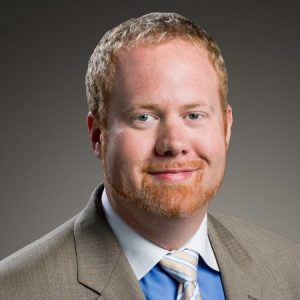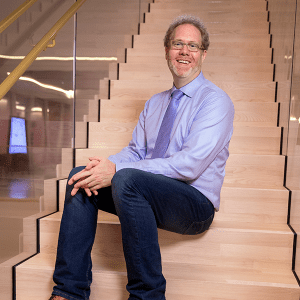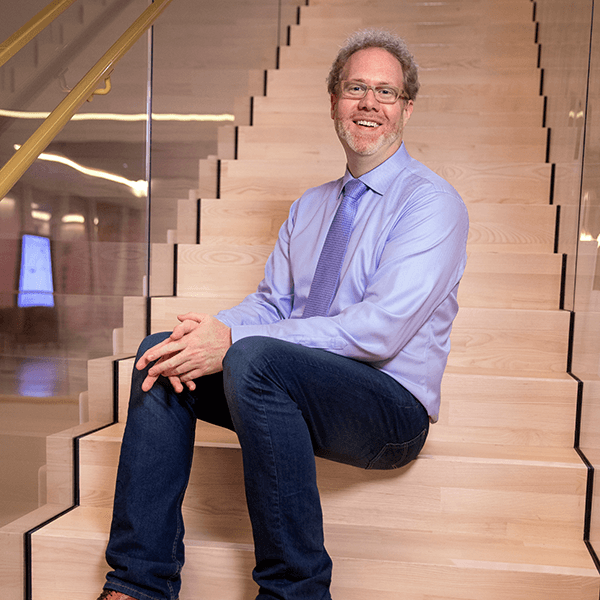C5 alumnus Steven Tiell is the 2019 recipient of the PGS Alumni Enterprise Vanguard Award (EVA). We had the opportunity to connect with him and learn about his career trajectory since graduating.
 PGS: To what do you attribute to receiving The Enterprise Vanguard Award?
PGS: To what do you attribute to receiving The Enterprise Vanguard Award?
Steven: First, I need to recognize my thoughtful wife (we met at the Presidio Graduate School), who nominated me for the award. Her nomination was in recognition of over five years of work getting General Counsels, Boards of Directors, and Senior Executives to see data ethics as risks that their organizations are not addressing, and should. The event that catalyzed a high level of concern from these senior leaders was the Cambridge Analytica scandal in the spring of 2018 where personal data was harvested from millions of people’s Facebook profiles without their consent and used to target political advertising in more than 200 elections globally. After that happened, there was a marked increase in demand for data ethics.
PGS: How do you feel your education at the PGS help you achieve this award?
Steven: In every way, my education at PGS helped me achieve this award. First, one of the primary outcomes of my PGS experience was the ability to not only articulate how I wanted to use my profession to affect change, but to actually put that into action. What attracted me to the role on the Technology Vision team at Accenture was the ability to shape the boardroom agendas of Global 2000 organizations. The Technology Vision is Accenture’s premier thought leadership that forecasts ways technology will disrupt business, government, and civil society – it is used extensively with clients throughout the world to plan for the future. That is the primary reason I applied for and accepted the position – it was a great platform to create systemic, positive impact in the world. Within my first six months in the role, I used my PGS training to identify a big, complex problem — we discovered that disparate technologies were maturing at such a rate that we would soon be presented with a bevy of challenges that all begged the reflection, “Just because we can, doesn’t mean we should.” This became a topic that I assembled a group of 20+ (mostly external) thought leaders around. In 2016, after three years of work, we published a handful of papers on ways companies can integrate data ethics into existing business processes. Learning about the importance of engaging a diverse set of stakeholders, and how to form those value propositions, was a key learning outcome of my PGS experience.
PGS: What are you currently doing?
Steven: I am currently leading the Responsible Innovation team for Accenture Labs – the organization at the tip of the innovation spear for the firm. My work entails publishing thought leadership, developing tools, and re-engineering business processes to mitigate inherent risks of scalability. We are transforming the way product management and software development is performed by integrating ethics into these processes. We also build tools for consumers and data disclosers to learn about what happens with their data. And I have started a “data ethics salon series” for data ethics practitioners to learn best practices from each other so the tech sector can advance to a more ethical place with greater agility.
PGS: How did the PGS help you with this career path?
Steven: PGS taught me to affect change in the system by creating large enough ripples to amplify my individual impact. I am in a role that enables me to have ripple-effects that go far beyond my own team, group, country, and company. I’m always on the lookout for opportunities to leverage this position for the greatest impact.
PGS: How has being a Presidian helped shape who you are today?
 Steven: When I make arguments to executive teams and boards of directors, I first connect with them on the things they care about: I frame solutions in ways that are more attractive than the alternatives, and I integrate sustainability principles wherever I reasonably can. A journey of 1,000 miles begins with a single step. It’s more important to find a landing spot that can be a launching-off point than it is to create wholesale change immediately. I learned all of this at the PGS. My passion for sustainability drives my career trajectory and work ethic. PGS taught me that. I have turned down more lucrative job offers because I am better-positioned to create more change where I’m at than other opportunities would have afforded me. PGS taught me how to value my personal sustainability, be fully engaged in all I do, and to keep my personal and professional life in balance. It’s a great path and being a Presidian helps me to stay on the path.
Steven: When I make arguments to executive teams and boards of directors, I first connect with them on the things they care about: I frame solutions in ways that are more attractive than the alternatives, and I integrate sustainability principles wherever I reasonably can. A journey of 1,000 miles begins with a single step. It’s more important to find a landing spot that can be a launching-off point than it is to create wholesale change immediately. I learned all of this at the PGS. My passion for sustainability drives my career trajectory and work ethic. PGS taught me that. I have turned down more lucrative job offers because I am better-positioned to create more change where I’m at than other opportunities would have afforded me. PGS taught me how to value my personal sustainability, be fully engaged in all I do, and to keep my personal and professional life in balance. It’s a great path and being a Presidian helps me to stay on the path.
PGS: What was the most valuable takeaway from your PGS experience?
Steven: There are two for me: (1) You must meet people where they are at in order to connect with them to have any hope of being able to sway them or get them aligned with your own cause; and (2) There is tremendous power and outsize benefits that can be had from radical stakeholder engagement.
PGS: What is your favorite quote from your PGS experience?
Steven: Hunter Lovins said: “In a stable economy, sustainability is a competitive advantage. In a down economy, sustainability is a turnaround strategy. In a collapse, sustainability is a survival strategy.”

